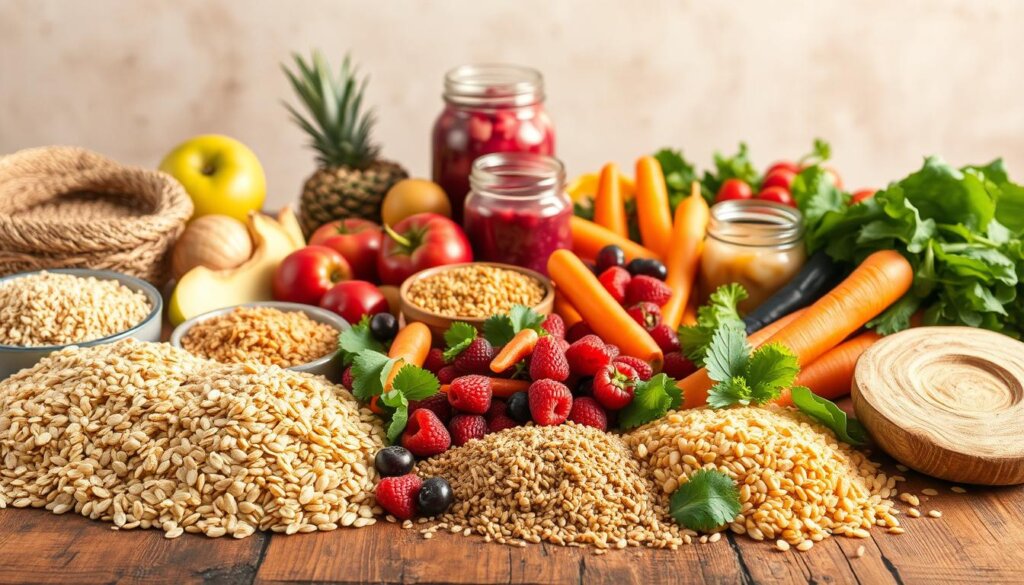Did you know most adults get less than half the fiber they need daily? Johns Hopkins Medicine reveals this gap impacts everything from immunity to inflammation. Modern lifestyles amplify stress, which directly disrupts gut function—creating a loop where poor digestion fuels anxiety, and anxiety worsens digestive discomfort.
Shifts in stomach acid, gut bacteria balance, and immune responses often drive these issues. When the gut ecosystem weakens, it struggles to manage stress hormones efficiently. This imbalance can lead to bloating, irregularity, and discomfort that feel impossible to escape.
Strategic dietary choices can break this cycle. Certain nutrients act as natural regulators, feeding beneficial bacteria while promoting smoother digestion. Many overlook their daily intake of these essentials, missing a chance to support both mental calmness and physical comfort.
Wellness Group specializes in personalized strategies to address these challenges. Their team helps clients optimize their well-being through science-backed approaches. Reach them via WhatsApp at +60123822655 (Mon-Fri 9:30 am–6:30 pm, Sat-Sun 10 am–5 pm) for tailored guidance.
Key Takeaways
- Most people consume less than 50% of their daily fiber needs
- Stress and gut function influence each other in a continuous loop
- Common symptoms include bloating, irregularity, and indigestion
- Targeted nutrition supports both mental and digestive wellness
- Professional guidance creates lasting improvements in gut health
Understanding the Gut-Brain Connection and the Impact of Stress

Click to 了解更多
Your gut and brain exchange messages faster than most text threads. This biological partnership explains why anxiety might send you sprinting to the bathroom or leave your stomach in knots. At the heart of this relationship lies a complex network that scientists now recognize as vital to overall wellness.
The Role of the Enteric Nervous System as the Second Brain
Your digestive tract houses its own independent nervous system—the enteric nervous system (ENS). With over 100 million nerve cells, this “second brain” controls digestion without relying on signals from your head. It produces serotonin and other neurotransmitters identical to those found in your central nervous system.
This neural web doesn’t just process food. It detects threats, regulates mood, and stores memories of past reactions. When the ENS senses trouble, it can trigger physical responses before your conscious mind even registers a problem.
How Stress Triggers Digestive Issues Like Bloating and Indigestion
During stressful moments, your body shifts into survival mode. Blood flows away from the gut to fuel muscles, slowing digestion. Stress hormones like cortisol disrupt enzyme production and gut contractions, leading to familiar discomforts:
- Persistent bloating after meals
- Unpredictable bowel movements
- Sharp stomach cramps
These changes also alter your gut’s bacterial balance, weakening its defenses. Over time, repeated stress exposure can make the digestive system hypersensitive—turning minor upsets into major disruptions.
Fiber for Stress-Related Digestion: Key Benefits and Natural Sources
What if your snack choices could calm both your mind and stomach? The right nutrients act like fertilizer for your internal garden, helping beneficial bacteria flourish. These microbes then produce compounds that soothe inflammation and stabilize mood signals.

The Science Behind Microbial Fuel
Soluble fiber dissolves into a gel-like substance, feeding friendly gut residents. Insoluble varieties add bulk to stools, keeping digestion regular. Together, they create short-chain fatty acids that strengthen intestinal walls and regulate stress hormones.
Everyday Superfoods for Gut Nourishment
Beans and lentils pack double the punch—they’re rich in both fiber types. Berries and apples offer soluble fiber with antioxidant boosts. For crunchier options, try broccoli or kale salads topped with pumpkin seeds.
Fermented picks like kimchi introduce live cultures that enhance the benefits of probiotics. Oats and quinoa provide steady energy while supporting neurotransmitter production. Dark chocolate (70%+) delivers fiber alongside mood-lifting compounds.
Rotate these options weekly to maintain microbial diversity. Your gut thrives on variety just as much as consistency—a balanced approach yields lasting results.
Lifestyle Strategies to Enhance Digestive Health
Your daily habits act like steering wheels for digestive wellness—small adjustments can redirect your gut’s entire trajectory. Simple shifts in routine often yield dramatic improvements in comfort and resilience.
Incorporating Mindfulness, Yoga, and Deep Breathing
Mindfulness meditation teaches your body to switch from “fight mode” to “repair mode.” Just 10 minutes daily can improve how your system processes meals. Pair it with yoga poses like child’s pose or seated twists to stimulate blood flow to abdominal organs.
The 4-7-8 breathing method works wonders for immediate relaxation:
- Inhale quietly for 4 counts
- Hold breath for 7 counts
- Exhale completely for 8 counts
This rhythmdirectly calmsdigestive muscles through vagus nerve activation.
The Importance of a Balanced Diet and Regular Exercise

Click to 了解更多
A balanced diet rich in colorful vegetables and lean proteins supports steady energy release. Time meals consistently—skipping breakfast often leads to evening overeating that strains your system.
Physical activity isn’t just about weight management. Walking after meals:
- Speeds up stomach emptying
- Reduces bloating
- Balances blood sugar levels
Aim for 150 minutes weekly of moderateexerciselike swimming or cycling. This routine helps maintain healthybodyweight while improving gutfunction.
Combining these strategies creates a sustainable way to reduce stress and enhance digestive efficiency. Consistency matters more than perfection—start with one change and build gradually.
Expert Practices for Maintaining a Healthy Gut and Body
Could your bedtime routine hold the key to better digestion? Research shows sleep quality directly impacts gut function—and vice versa. Proper rest allows your body to perform nightly maintenance critical for digestive wellness.

Optimizing Sleep and Hydration for Better Digestion
Seven to nine hours of nightly sleep enables essential repair work. During deep rest phases:
- Your system produces digestive enzymes
- Intestinal lining regenerates
- Metabolic waste gets cleared
Hydration works hand-in-hand with sleep. Six to eight daily glasses of water:
| Benefit | Sleep | Hydration |
|---|---|---|
| Nutrient Transport | Enhances during rest | Supports 24/7 |
| Waste Removal | Nightly detox | Prevents constipation |
| Microbiome Balance | Regulates bacteria | Maintains mucus layers |
Integrating Professional Guidance for Personalized Health
Persistent gut issues often require expert analysis. Healthcare providers use specialized tests to:
- Identify food sensitivities
- Assess bacterial balance
- Create tailored nutrition plans
Combining self-care with professional support addresses both symptoms and root causes. This dual approach helps maintain healthy body function while preventing minor concerns from becoming chronic.
Practical Tips for Managing IBS, Anxiety, and Stress
Nearly 1 in 5 Malaysians experience digestive discomfort linked to stress. Research reveals that irritable bowel syndrome (IBS) often coexists with anxiety, creating a cycle where gut issues worsen mental strain. While the enteric nervous system plays a key role, daily habits can break this pattern.
Simple Daily Habits to Reduce Stress and Relieve Bowel Problems
Consistent routines help calm both mind and gut. Try these strategies:
| Habit | Action | Benefit |
|---|---|---|
| Meal Timing | Eat at fixed times daily | Reduces bowel urgency |
| Portion Control | Use smaller plates | Eases digestion |
| Mindful Eating | Chew slowly | Prevents bloating |
| Relaxation Practice | 10-minute breathing exercises | Lowers anxiety |
Progressive muscle relaxation and guided imagery directly address physical tension linked to bowel syndrome. Pair these with gut-friendly foods for better results.
When to Seek Professional Support
Persistent symptoms like chronic constipation or anxiety require expert care. Wellness Group’s team offers:
- Personalized meal plans
- Stress management techniques
- Progress tracking tools
Reach them via WhatsApp at +60123822655 (Mon-Fri 9:30 am–6:30 pm, Sat-Sun 10 am–5 pm). Their specialists combine dietary guidance with anxiety-reduction strategies for lasting relief.
Conclusion
Effective wellness strategies bridge the gap between emotional stress and bodily functions. Research confirms that nurturing gut health through mindful eating and stress reduction creates lasting improvements in both physical comfort and mental clarity. A diet rich in diverse, nutrient-packed foods supports microbial balance while stabilizing mood-regulating hormones.
Regular practices like deep breathing and consistent meal timing reinforce the body’s natural rhythms. These habits help maintain a resilient digestive system capable of handling life’s pressures. Studies show combining dietary adjustments with relaxation techniques yields better results than focusing on single aspects of health.
For those seeking guidance, personalized plans from nutrition experts can accelerate progress. Addressing both psychological and physiological factors breaks harmful cycles, paving the way for sustained well-being. Small, consistent changes often create the most meaningful transformations in daily life.
FAQ
How does stress influence digestive problems like bloating or indigestion?
Stress activates the body’s “fight-or-flight” response, which disrupts the gut-brain axis. This can slow digestion, trigger inflammation, and lead to discomfort such as bloating, cramps, or irregular bowel movements. Managing anxiety through relaxation techniques helps calm the nervous system.
What foods support a healthy gut microbiome during stressful periods?
Whole foods like berries, lentils, oats, and leafy greens are rich in prebiotics and nutrients. These promote beneficial bacteria growth, strengthen the intestinal lining, and improve nutrient absorption. Fermented options like yogurt or kimchi also add probiotics for balance.
Can lifestyle changes really improve irritable bowel syndrome (IBS) symptoms?
Yes. Practices like yoga, deep breathing, and consistent sleep patterns reduce cortisol levels, easing bowel sensitivity. Pairing these with a balanced diet low in processed sugars and high in whole grains can alleviate IBS flare-ups linked to stress.
Why is hydration important for managing stress-related digestion issues?
Water aids in breaking down food, preventing constipation, and maintaining mucosal health in the intestines. Proper hydration supports enzyme function and ensures smooth movement of waste, which is crucial when stress slows digestive processes.
When should someone seek professional guidance for gut health concerns?
If symptoms like persistent abdominal pain, drastic appetite changes, or unexplained weight loss occur, consulting a specialist is key. Wellness Group offers personalized plans via WhatsApp (+60123822655) during business hours to address individual needs.






